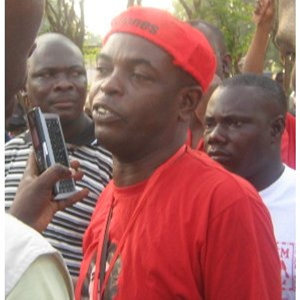 Kwesi Pratt faced charges for plotting to cause distability in 1992
Kwesi Pratt faced charges for plotting to cause distability in 1992
The Managing Editor of the Insight Newspaper, Kwesi Pratt Jnr, has detailed how he first came to be acquainted with former President John Agyekum Kufuor.
Speaking as a guest on Footprint, hosted by Samuel Atta Mensah on Channel One TV, Pratt said his relationship with President Kufuor, then a lawyer, started in 1992 when he was charged together with the late New Patriotic Party (NPP) flagbearer, Professor Adu Boahen.
"President Kufuor had offered to be my lawyer, and I said no, I will defend myself. He insisted that I needed a lawyer to guide me through the law and so on. So, I came to an understanding with President Kufuor, and if you look at all the pictures of the trial, you will see that President Kufuor sat behind me.
"He was giving me advice and all kinds of things. That was the beginning of a very close relationship that I developed with President Kufuor," Pratt said.
Background
Professor Adu Boahen and Kwesi Pratt were charged under section 25(a) of the Provisional National Defence Council Law (PNDCL) 78.
The charges were brought against them during a period of political tensions and transitions in Ghana as the country was moving from military to democratic rule.
Adu Boahen, a respected historian and academic, was also a prominent political figure.
He was the New Patriotic Party (NPP) candidate in the 1992 presidential election.
Kwesi Pratt, a well-known journalist and social commentator, was actively involved in political activism and was a member of the Movement for Freedom and Justice.
The trial occurred at the National Public Tribunal, a court established by the military regime to investigate political and economic crimes.
The charges were later dropped against the duo, a decision which, according to Pratt, was largely influenced by a 30-page statement he wrote at the police station.
The statement contained details of atrocities committed by the military-led Provisional National Defence Council (PNDC) government, including his own experiences while in detention.
"I knew that the trial could not end from the very beginning. I had been arrested from my house in Kotobabi. Prof. Adu Boahen was teaching in Legon when he was picked up from the classroom, and we were taken to the CID headquarters. We were cautioned and asked to write statements.
"Within 15 minutes, Prof. Adu Boahen had finished writing his statement, but it took me hours to write mine. So, Prof. Adu Boahen kept pinching me all the time, saying, 'What are you writing? You are writing too much. You are implicating us. Please stop.' But I kept writing because I knew what I was doing," he narrated.
Pratt explained that he ensured his statement contained details that would discourage the police from reading it in open court due to its content.
"What I was doing was writing a statement that nobody would dare read in open court... I think I ended up writing about twenty to thirty pages.
"It took me hours to write my statement, and I was asking for more paper and writing and writing. In that statement, I spoke about my experiences in guard rooms, the number of people who had been killed in guard rooms, the people who killed them, and so on. Who would dare read such a statement in open court? I was talking about cases of corruption that had come to my notice, PNDC secretaries allegedly involved, and so on. So, what I was actually doing was not just writing a statement; I was creating a bomb," he stated.
Ultimately, the case was discontinued, much to the surprise of his co-defendant, who later expressed shock when he revealed the contents of his statement to him.
GA/AE